#and despite all this I must concede that it’s easier to criticize a script than write one myself
Explore tagged Tumblr posts
Note
Was just reading your Padamavaat fics and wondered, if you had to rewrite the story of the film within the scope of the original ending, what changes would you make to plot or characterisations? Like, an adaption of the legend was always going to end in jauhar, but your way of writing the women and their motivations feels far more real, even though you dislike the ending.
AHAHAHAHA OH POOR ANON HERE I GO.
Above all I would most like to change the movie so it doesn’t specifically focus on literal children being, presumably, peer-pressured into the fire. For one thing, I believe in real life, children and pregnant women were smuggled out of the fort and excluded from the ritual. For another, the movie already ignores the narrative of anyone who isn’t a high caste warrior and/or wife, so do we really have to have the horribleness of children being forced into self-sacrifice rubbed in our faces?
*shudders*
That said, I think you are spot on when you say that the film really had to end in jauhar --anything less would feel like a cheat. I absolutely understand that--but from a narrative standpoint, my problems with it are (1) the fact that Padmavati never really articulates her motivations and (2) the lack of any other options presented for the women.
So. Starting with (1)--yes, Padmavati gets that big speech to the other women about valor and HONOR!, etc. and in her goodbye to Ratan Sen, gives that nauseating speech about how she must take his permission even to give up her life--
(Apologies. But. You guys, even Sita, who usually--though unfairly--gets turned into an excessively devoted wife in most mainstream media very much believed that her life was her own and not her husband’s, to the point where she outright defies him in returning to her mother/effectively committing suicide. The sheer horror of that dialogue makes me shudder all over again)
--but that said, what prompts her. Is it that she’d rather die than be made a prisoner? Is it that she knows Alauddin’s character well enough that she knows that failing to capture her will break him more than defeat on the battlefield? *throws hands up, because your guess is good as mine*
Or, I propose a change that would honestly work with the rest of film as scripted/directed, albeit probably come off very controversial: have Padmavati, disgusted by Ratan Sen’s disrespectful behavior both during and after her rescue of him, realize that both her husband and her enemy are equally bad, and that, therefore, whether Chittor wins or loses, she will still be in the hands of a man she cannot love or trust. Have her--in a shoutout to Sita, honestly--throw herself into the fire, if you must, so that they both can’t have her, as neither of them deserve her. Have the film really bite into its misandrist undertones, because surely I’m not the only one who watched Ratan Sen and just. recoiled with horror?
Also, Padmavati aside, I really wanted to see--well, options for the other women, Even if you say that a woman would rather kill herself than be abused by the invaders (a valid choice! that’s fine!), I hate the implied victim-blaming of those who decide that they’d rather take their chances with the invaders, or those who’d rather die fighting, or those who’d rather try and escape, or--
The point is there is no one right way to be a woman, and I hate that the movie breaks down its roles to either Rajput swords or Rajput bangles (also, in a really gender-essential way, but that’s a different discussion). Even a quick cut of some women being offered the chance to fight/escape/something, and taking it, would allow me to watch that final scene with the awe I am meant to feel rather than the horror. Because in all those women, you guys know there were at least a few who didn’t want to go through with jauhar, and didn’t feel they could speak up--and that , to me, is chilling.
Another way to solve this problem, TBH, is to make the film’s Mehrunissa’s, too. Make her more than the sad cipher she is for most of the movie--for example, can you guys imagine the movie starting with the shot of the desert and the ostricth and Mehru’s voice narrating, “We none of us guessed what he would come to mean for us...” (Mehru would add more color and personality as a narrator than Generic Woman Voiceover.
Pair Mehru and Padmavati’s stories--as Padmavati adjusts to Rajput customs, Mehru navigates the court she grew up in, now turned upside down by Khilji’s chaos. As Padmavati tries to bond with Nagmati, have Mehru reach out to and interact with Jhatyapali. Give Mehru a voice, so that the movie’s not just one woman’s story, but many others--and then, as a bonus, you can lose the annoying and redundant scenes of “....did you know Khilji is crazy” and the weird and historically inaccurate homophobic nature of Khilji and Kafur’s interactions. (Why couldn’t they just take delight in each other’s wickedness, even if they had to both be villains? Why is Khilji so OTT abusive, and Kafur gross and depraved? Why are their scenes honestly just used to mirror the Wholesome Heterosexual Love of Ratan Sen and Padmavati?)
what that gives you, then, is an end where Mehru--in contrast to Padmavati--is a woman who chooses to survive, so that you give equal screen time and respect to both choices women made in those days, rather than just one. And plus, having Mehru’s wistful voiceover narrate Padmavati’s sacrifice warms my shipper heart would hypothetically end the movie on a “Who Lives, Who Dies, Who Tells Your Story” note (to paraphrase Hamilton), and hopefully dig into the characterization of both women.
I’m sorry for the enormous essay! Thank you for the interesting question and lovely compliments :)
#padmavaat#padmavati#mehrunisa#meta#apologies for the Ratan sen hate#and despite all this I must concede that it’s easier to criticize a script than write one myself#so please excuse my complaining
55 notes
·
View notes
Text
Jack Jeanne Playthrough Part 3 (April 5)
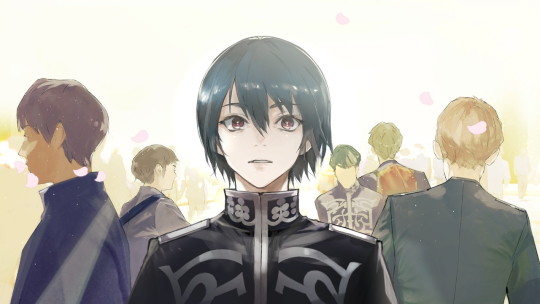
1 month later. April 5th in the VN. Kisa is at Univeil and excited she passed the entrance exam. She runs into her childhood friend Yonaga who's also been accepted. He's shocked that Kisa is attending too, but before she can explain Suzu joins them, introduces one each other.
Quartz's theme is "transparency" where many inexperienced performers who haven't specialized yet tend to go.
Onyx = Jacks whose forte is in dance.
Rhodonite = Jeannes who specialize in song.
Amber is where talented and unique students gather.
Suzu theorizes Kisa would be in Rhodonite because of her appearance, himself in Onyx because his physical abilities make him more suitable for dancing than singing or acting. Yonaga would like to be in Quartz.
Yonaga: Quartz...would be nice.
Suzu: I get what you mean!
Yonaga: Huh?
Suzu: Tbh I enrolled in Univeil cause I really admire Tachibana Tsuki, the legendary Jackace of Quartz!
Kisa: ...!
Suzu: That's why I wanna be in the same class as Tachibana Tsuki...come to think of it, your last names are the same.
Kisa: (If people find out I'm related to Tsuki-nii, it might make it even easier for them to discover my identity...! But it might be better than lying poorly...)
Kisa: It's true. It's the same (nonchalantly)
Yonaga: ......
Suzu: Maybe you guys are distant relatives!
Kisa: *nervous laughter*

Yonaga cuts in and says they should go check which class they're in. Kisa thanks Yonaga for the save. Their year is the 78th class of Univeil. All 3 are in Quartz.
Kisa gets called to the headmaster's office.
Chuuza congratulates her and informs her about her admission. The only ones who know that Kisa is a girl is him, Quartz's homeroom teacher Enishi Rokurou, and now Yonaga, Kisa's childhood friend. Chuuza is surprised that someone who knew about Kisa enrolled in the school.
But if anyone else finds out that she's a girl, expulsion. But since a lot of students are feminine, she won't have to go out of her way to act and dress like a boy. He reminds her to build trust with the rest of the students, and aim to become a lead and aim for the top.
Kisa arrives to Quartz's homeroom late.

??: Yes, yes, come right in.
Kisa: (The teacher...? But he's in a student uniform.)
??: You were called in quite loudly during the school announcements. Did you run into any issues on the first day? Theft, robbery, manslaughter, extortion, coercion, or a bank robbery, perhaps...?
(Please watch the clip of this scene. Can you tell he and Furuta share the same VA? 😄)

Fumi: No one like that would be in our school, Kuro.
??: But wouldn't be great to have such a plucky 1st year around, Fuumin! All the world's a stage!
Fumi: And, if the cops came?
??: I concede! Law is what keeps society together.
Kai: ...you two are bothering the 1st years.
Kisa finds a seat by Suzu and Yonaga.
Neji Kokuto (3rd year, 76th class of Univeil) welcomes the 1st year students to Univeil and Quartz. Class leader-slash-scriptwriter-slash-director-slash...all kinds of other things! He provides an info-dump about Univeil for us.
5 performances in total: Rookie, Summer, Fall, Winter, and Univeil Exhibitions. The Rookie Exhibition is where the 1st years take the lead roles, which is going to be held May 30th. Today is April 5th, so less than 2 months remain. Most viewers will watch over them warmly, but others will be more strict, like journal reporters, critics and avid Univeil fans. Neji will write a script to allow even novices like them to shine on stage. Casting will be announced mid-April. Upper years are also participating and support the 1st years.
Neji: If you have any questions, all you need is to ask. I'm sure all our seniors here will be more than happy to help you.
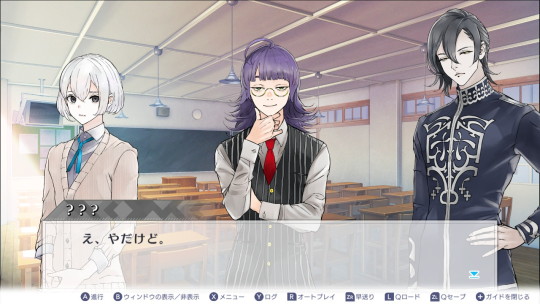
??: What, no way.
Neji: With some exceptions of course! Mwahaha. Mikki's a 2nd year now, you can be a little nice to your juniors, hm?
??: ...
Kisa notes he looks cute like a doll. Shirota Mitsuki, noted for his singing. He catches Kisa staring at him, and she apologizes.

Neji asks if anyone has any questions. You're given 3 options: 1) How casting is determined, 2) Type of training to be done, 3) No questions.
Casting is based on Neji's subjective judgment. Everything from how they're doing in lessons, campus life, the way they walk, talk, physique, voice, facial expressions. Essentially based on his intuition, which he uses to find gemstones in the rough.
Training I'll explain later, there's gameplay related to it.
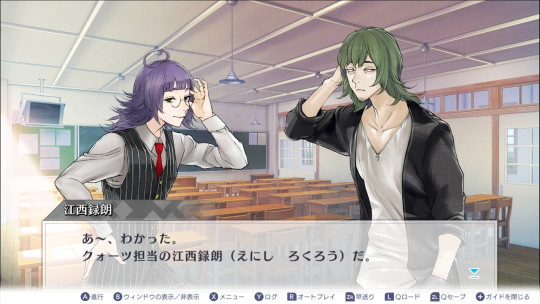
Neji finishes his spiel and passes it on to Quartz's homeroom teacher, Enishi. Pretty low energy. Lessons start tomorrow. Class is dismissed.
Suzu meets Kisa outside the Quartz dorms and asks if she's ready to introduce herself to the other students. He notes it's hard to find people since Univeil is so large. They chat for a bit, Suzu asks Kisa to call him by his first name, so Suzu-kun it is.

Inside Yonaga's dorm. He's finished unpacking, though he's still yet to put away his books (on theatre). He asks how Kisa got into Univeil, and she explains what happened. Yonaga says he'll help Kisa to make sure she stays at Univeil. He's glad that Kisa is here with him.
Yonaga: Kisa-chan, about Tsuki-kun...
Kisa: I can't get in touch with Tsuki-nii, but I'm sure he's doing fine wherever he is.
Yonaga: I see. Yeah, I'm sure he is.
(Isn't that sketchy? Maybe he turned into that weasel with the moon on its belly lol)
Kisa begins her search for the Quartz students. At the Univeil courtyard, Kisa hears Mitsuki singing.

"Within this chest of mine I dance, the rhythm of possibilities"
Kisa: (I'd heard he was lauded for his singing, but he really has a beautiful voice...the lyrics paint the scene in my head.)
Mitsuki: ...could you not stare at me like that? It's uncomfortable.
Kisa: Oh, I'm sorry!
Mitsuki: Oh, you again. The 1st year who came in late.
Kisa: Yes. My name is Tachibana Kisa. It's a pleasure to meet you.
Mitsuki: Huh...you've got a face like a girl.
Kisa: Eh? Y-yes, I suppose so.
Mitsuki: A high-pitch voice. A delicate figure. And a Jeanne at that. At least be aware of your own features.
Kisa: I-I'm sorry.
He sighs and introduces himself. 2nd year, 77th class of Univeil. A Jeanne and a tresor (songstress/diva) of Quartz. VA is Kajiwara Gakuto (Asta). Kisa compliments him on his singing.
Mitsuki: So you were eavesdropping.
Kisa: I-I'm sorry.
Mitsuki: Well, not like I care either way. Later.
Kisa: He left...I guess he doesn't really like interacting with people. But his voice really was beautiful.
(If I had to describe Mitsuki's tone, it would be similar to Kenma, but a bit more antisocial lol)
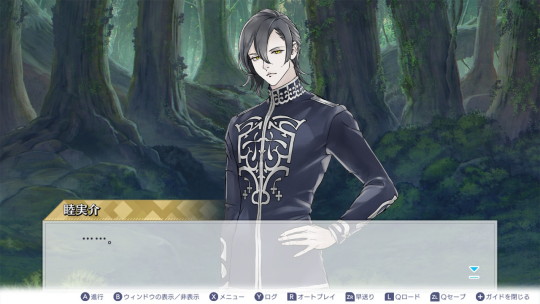
Kisa finds Kai in the forest, seemingly concentrating on something. She decides to come back later, but Kai notices her.
Kai: ...? Quartz's 1st year?
Kisa: Yes! I'm Tachibana Kisa.
Kai: I see, you're...
Kisa: Yes!
(awkward silence between the two)
Kai: Mutsumi Kai, 76th class of Univeil. I'm a 3rd year.
Kisa: So I should call you Mutsumi-senpai!
Kai: Kai is fine. You can call me that around other people too.
Kisa: But...
Kai: ...
Kisa: ...(agrees)
Kai: ...
Kisa: T-then, I'll call you Kai-san!
Kai: Okay.
Kisa notes Kai is the Jackace of Quartz. And since Tsuki was also the Jackace, that means he must be talented too.
Kai: I'm a vessel meant to garnish the Aljeanne. Nothing more, nothing less.
Kisa is confused by his statement. Convo ends.

Kisa runs into Neji next in the hallways. He enters a room then promptly comes back out.
Neji: Welcome!
Kisa: Ah!
Neji: What're you doing in a place like this?
Kisa: I'm going around introducing myself to everyone in Quartz.

Neji invites her into his workroom where he writes his scripts and plans his staging. But he also performs on stage, any male or female role, from a shining prince/princess to old grannies/gramps.
He's currently working on the script for Quartz, but he won't reveal it just yet. Kisa asks if the other class leaders write the scripts like he does, but Neji is a special case, who screenwrites, directs and performs.
Neji: Once you get carried away, you can't see what's going on around you. What we do has no end to it. Acting, dancing, singing, they're fields that you can pursue for a lifetime. You could reach the stars, or merely end up as a master of none. No matter how much time, it will never be enough. It's a terrifying world out there. That's why it's so engrossing. The stage is a colossal device. The Jacks and Jeannes make up the gears, and I am the craftsman who pieces them together. Let's create a fantastic stage together, Tachibana-kun!
Neji must continue writing, and wishes Kisa the best for the Rookie Exhibition. (Neji definitely talks the most out of the main cast lol. And fast too, talks a mile a minute and tone varies hugely)

Kisa finds Fumi standing languidly in the middle of the dance room, taking deep breaths before beginning to dance. A Japanese-style dance where his movements are gentle, beautiful and brilliant. He comments on Kisa staring intently at him, just like during the entrance exam.
Kisa is surprised that Fumi remembered, despite the number of applicants.
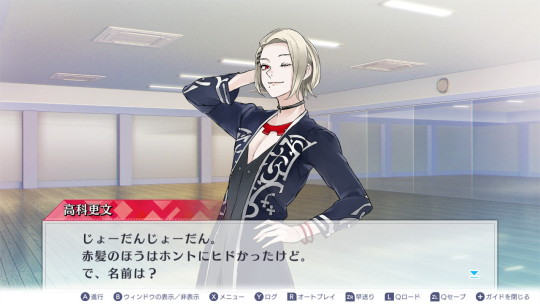
Fumi: I remember you and the red-haired guy well cause you two danced so terribly.
Kisa: Oh...
Fumi: I'm just kidding. Though the red-haired guy really did suck.
Kisa introduces herself, and Fumi pauses at hearing the name Tachibana. 3rd year Takashina Sarafumi, 76th class of Univeil, but he prefers being called Fumi, no senpai honorific attached. Kisa ends up calling him Fumi-san.
Fumi: Let's have fun, Kisa. (leaves)
Kisa: It's overwhelming seeing him up close. So that's the power of an Aljeanne.
Kisa goes to her room excited for her new life at Univeil and retires for the night for her 1st day of classes tomorrow.
***
previous || next (to be updated)
43 notes
·
View notes